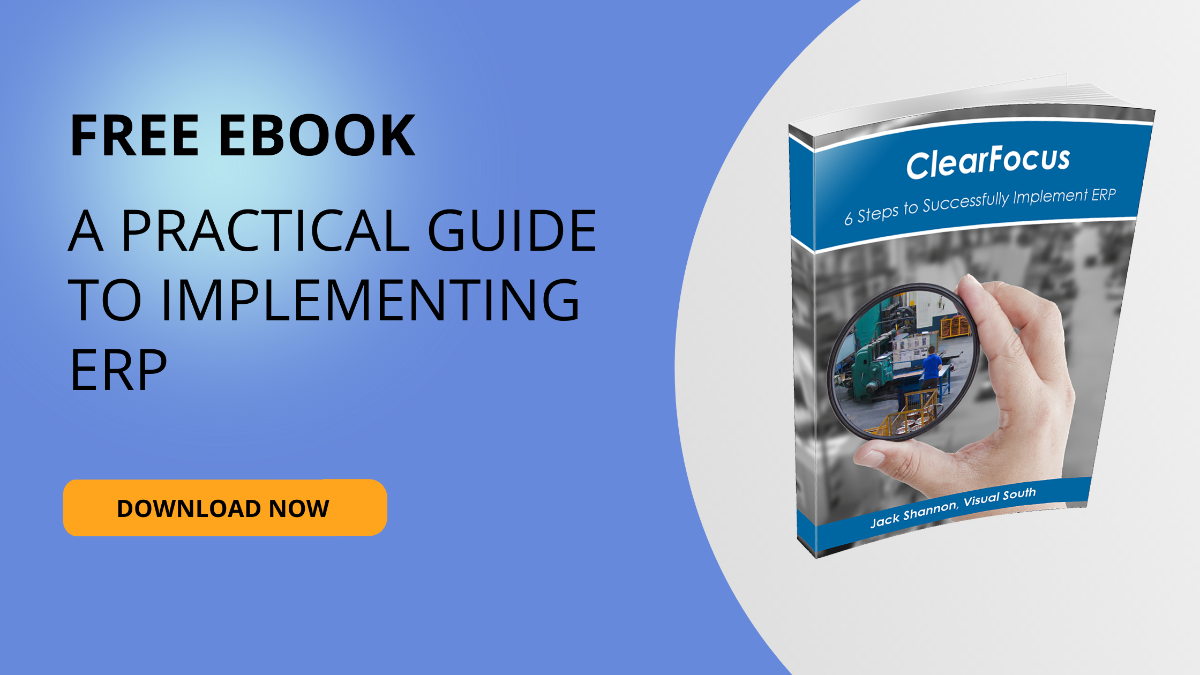Early in my career, someone shared a piece of wisdom that resonates deeply: “There isn’t anything more expensive than cheap ERP.” Over time, I’ve seen the truth in this statement. The top companies view their ERP system as a strategic asset and invest accordingly. Like sophisticated equipment on the shop floor, an ERP system requires regular maintenance, training, and updates to perform at its best. Neglecting these aspects can lead to suboptimal performance and missed opportunities.
To ensure your ERP is functioning at peak levels, it needs to be set up correctly from the start. Investing in comprehensive ERP implementation services is crucial for aligning your ERP, people, and processes. This blog post outlines the critical services that should be provided by your vendor during an ERP implementation to ensure long-term success.
Download: 6 Steps to Successfully Implement ERP
What to expect from ERP implementation services
Business process design
One of the foundational steps in an ERP implementation is business process design and this must be offered by your vendor. Current procedures are often based on the tools and systems an organization has in place. With the introduction of a new ERP system, these processes need to be re-evaluated and redesigned to align with the new capabilities and efficiencies the ERP brings. This involves:
- Analyzing current processes: How things are done right now
- Identifying inefficiencies: Where bottlenecks and areas for improvement exist
- Redesigning processes: What new workflows will leverage the ERP’s features
Effective business process design ensures that the new system enhances rather than hinders operations. It’s about making the most of the new tool to improve overall efficiency.
See Also: Business Process Review: 5 Steps To Include
Training
Once new processes are designed, it is essential to train users on how to perform their jobs within the new system. The training offered by your vendor should be comprehensive and tailored to different roles within the organization. Key components of effective training include:
- Role-based training: Ensuring that each user understands how to use the ERP in the context of their specific job functions
- Hands-on practice: Providing practical sessions where users can experience the system
- Ongoing support: Offering continuous learning opportunities and support to address questions and issues as they arise
Training is not a one-time event but an ongoing process that evolves as users become more familiar with the system.
Read More From Our ERP Implementation LibraryWe’ve written a lot about ERP implementation. Check if any of these articles might be helpful to your process: |
Data cleansing and conversion
Data is the lifeblood of any ERP system. During implementation, there is a prime opportunity to clean up existing data. This involves:
- Data cleansing: Removing outdated, duplicate, or incorrect data
- Data validation: Ensuring the remaining data is accurate and complete
- Data conversion: Migrating the clean data into the new ERP system
Starting with clean, valid data in the new system is crucial for accurate reporting and analysis, so be sure that your vendor offers this as part of their implementation services. It helps in making informed business decisions and ensures the ERP system functions optimally from day one.
Testing
Thorough testing is essential to verify that the system is configured correctly, users can perform their jobs, and data processes yield the desired results. Every implementation service should include these testing phases:
- Unit testing: Checking individual components of the system
- Integration testing: Ensuring different modules work together seamlessly
- User acceptance testing (UAT): Validating that the system meets the end-users’ needs and expectations
Testing helps in identifying and addressing issues before the system goes live, reducing the risk of disruptions and ensuring a smoother transition.
See Also: What Goes Into an ERP Implementation Testing Process?
Post-implementation support (Continuous improvement)
One common mistake companies make is viewing the ERP go-live as the end of the project. In reality, it marks the beginning of a journey towards continuous improvement. Setting user expectations correctly is vital to ensure they see the ERP system as a tool for ongoing enhancement rather than a static end state. Post-implementation support from your vendor should include:
- Regular system reviews: Periodic assessments to ensure the system remains aligned with business needs
- Ongoing training: Continuous learning opportunities to keep users proficient and informed about new features
- Expert consultation: Engaging with ERP experts who can provide insights and recommendations for optimization
A good ERP partner acts like a coach, providing feedback on performance, identifying weaknesses and strengths, and suggesting improvements to maximize the ERP system’s value.
See Also: The 5 Keys to ERP Training Post-Implementation
Conclusion
ERP implementation is a complex but rewarding process that, when done correctly, can lead to significant improvements in efficiency, data accuracy, and overall business performance. To recap quickly, the key services that should be provided by your vendor during an ERP implementation include:
- Business process design: Redesigning workflows to align with the new ERP system
- Training: Ensuring users are proficient in using the new system
- Data cleansing and conversion: Starting with clean, valid data in the new ERP
- Testing: Verifying system configuration and data processes
- Continuous improvement and post-implementation support: Viewing the ERP go-live as the start of ongoing enhancement
By investing in these services, companies can ensure a successful ERP implementation that delivers long-term value. Engaging with an experienced ERP partner who provides these comprehensive services can make a significant difference in the overall success of the project.
Remember, your ERP system is a strategic asset. Treat it as such, invest in its implementation and ongoing optimization, and it will pay dividends in improved efficiency, data accuracy, and business performance.









